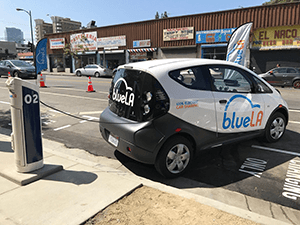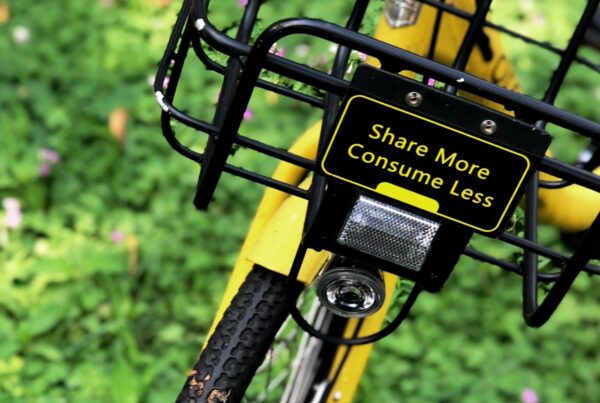Welcome to the Shared-Use Mobility Center’s weekly guide to the most impactful news, thought-provoking articles and innovative technologies that are shaping our transportation future. We believe in sharing information, just like sharing cars, bikes, and scooters, so if there’s anything additional you’d like to see, just drop us a line.
Announcements
Save the date!
2020 National Shared Mobility Summit
March 17-19, 2020
Hyatt Regency McCormick Place, Chicago, IL
Summit website launching next week! Learn more.
 Take SUMC’s Shared and Electric Mobility Survey
Take SUMC’s Shared and Electric Mobility Survey
Practitioners from a variety of sectors and backgrounds are critical to the success of the shared and electric mobility projects emerging nationwide. Shared-Use Mobility Center would like your thoughts on ways to support the deployment of these clean mobility options here.
By taking this survey, you can help build a community of mobility practitioners who share an understanding of the common barriers to carrying out clean, shared mobility projects, and we’ll draw on your insights to identify resources that can help us move past them and create clean mobility for all. We appreciate your help! If you have questions, please contact [email protected]
New opportunity to join the SUMC team
As a Project Associate, you’ll work across the public, private, and nonprofit sectors to shape the future of mobility around climate and social equity goals. You can access the complete job description here as well as all our openings in both Chicago and Los Angeles. We look forward to hearing from you!
Ridehailing/Carsharing/Carpooling
Lyft has removed what riders pay for each trip from the fare breakdown that drivers receive, a move drivers believe will make it harder for them to track their weekly earnings while removing pay transparency.
Penske has launched its own free-floating carshare service called Penske Dash in DC and Arlington, VA with transportation software company Ridecell providing the platform for the app.
Lyft is opening a new service center in Chicago that will help ridehail drivers with vehicle maintenance and paperwork while adding 200 new jobs to broadly expand the Divvy bikeshare system.
Mobility startup Perpetoo launches Romania’s first-ever peer-to-peer carsharing platform in four cities including Bucharest.
Partnerships and Programs
Ford plans to launch 12,000 electric charging stations with a total of 35,000 plugs in the United States (and parts of Canada) and is working with Greenlots and Electrify America to make it happen.
The FTA is giving Reno’s RTC a grant for $40.4 million for the RAPID Transit BRT Extension project that will expand 1.8 miles from downtown to the University of Nevada.
A new report from London City Hall on the city’s Ultra-Low Emission Zone shows a 36% decrease in nitrogen dioxide levels in central London since the launch of the emissions-reducing project and 13,500 fewer cars in the center every day. Great work London!
South Bend, IN is piloting a new program that gives free transit passes and subsidized Lyft rides to late-night workers and employees with odd shifts, all thanks to a $1 million grant through the Bloomberg Philanthropies Mayors Challenge.
Bikesharing and Micromobility
A new mobility startup called Tortoise wants to outfit dockless scooters and bikes with autonomous technology to tackle sidewalk clutter and on-demand availability.
Disability rights advocates have filed a lawsuit against the City of Minneapolis and dockless scooter companies, saying the scooters are creating hazards for people with disabilities on city sidewalks. This follows recent suits filed in California against dockless mobility companies about similar sidewalk access barriers.
Uber’s EV mobility offering JUMP is testing dynamic pricing for dockless scooters in Dallas that will offer certain rates based on historical demand.
Evanston, IL is preparing regulation to allow e-bikes on city streets to promote car-free living and help lay the groundwork for Divvy’s inevitable launch of pedal-assist bikeshare in the region.
Transit
Mayor Lori Lightfoot has announced that Chicago will receive $20 million to improve bus speeds and service around the city as part of its Bus Priority Zone Program, focusing on bus-only lanes and other transit priority improvements.
Transdev CEO Yann Leriche shares his thoughts on where microtransit is heading in today’s multimodal transportation ecosystem and how it can it can achieve the right balance between experimentation and viability.
Take transit, get to your flight quicker. A new proposal from San Francisco’s BART wants transit users to jump ahead in the security line at San Francisco Airport to help cut down on car trips.
What would high-speed rail from Atlanta to Charlotte look like? How about extensions to DC and Boston? The Georgia DOT wants to know, and is holding open houses in Atlanta, Greenville, and Charlotte to find out.
Technology
In a world of constant tracking and location logging, companies and governments need to work together to make sure data is anonymized and the right policies are in place to protect data sensitivity.
The New York MTA will test innovative accessibility features, such as wayfinding apps, maps for the visually challenged, digital signage, and in-station navigation, at the new Accessible Station Lab in downtown Brooklyn as part of a pilot to make transit stations easier to navigate for people with mobility-related disabilities.
Renault is testing an on-demand ride service with two autonomous and electric Zoe vehicles at the Paris-Saclay urban campus while working with Nissan and self-driving tech startup Waymo to study a self-driving car route between Paris airport and the La Defense business district.
Western Michigan University will be using two autonomous shuttles around campus to offer new transportation options for students with disabilities as part of a pilot program for the Michigan Mobility Challenge.
Urban Sustainability
House Democrats Ayanna Pressley, Jesús “Chuy” García, and Mark Takano have formed the Future of Transportation Caucus to address transportation equity, access, and sustainability in the US. They (and SUMC as well) hope these issues are front-and-center as the $358-billion bill America’s Transportation Infrastructure Act makes its way through Congress now.
As San Francisco moves to remove cars from busy Market Street while adding more cycling infrastructure, Curbed wants you to remember how fun car-free streets in San Francisco can be with a nod to the city for turning the winding Lombard Street into a Candyland pedestrian paradise back in 2009.
The world is filled with demand-based pricing for all types of services and everyday activities so why has it been a public taboo to use it for our roads?Luckily, many cities are thinking or rethinking congestion pricing.
With people buying more cars than ever, cities and advocates should not only rely on new mobility services to fix things. Better street design and policy that prioritizes transit and shared mobility over private vehicles can replace that primary or secondary car for many.
Requests for Proposals, Qualifications, or Information
RFP: Real-time Curb Management API
Bay Area Rapid Transit District
San Francisco, California
Deadline: November 20, 2019
RFP: On-Demand Mobility Software
Marin County Transit District
San Rafael, California
Deadline: November 25, 2019
RFP: Environmental Assessment Services
VIA Metropolitan Transit
San Antonio, Texas
Deadline: November 26, 2019
Did someone forward this to you? You can sign up for our newsletter here.



